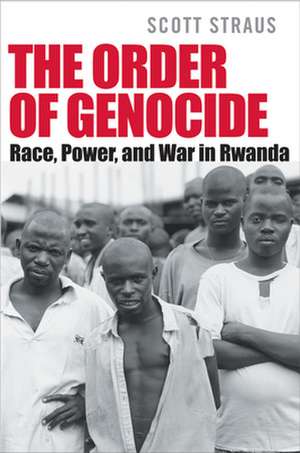The Order of Genocide – Race, Power, and War in Rwanda
Autor Scott Strausen Limba Engleză Paperback – 15 iul 2008
According to Scott Straus, a social scientist and former journalist in East Africa for several years (who received a Pulitzer Prize nomination for his reporting for the Houston Chronicle), many of the widely held beliefs about the causes and course of genocide in Rwanda are incomplete. They focus largely on the actions of the ruling elite or the inaction of the international community. Considerably less is known about how and why elite decisions became widespread exterminatory violence.
Challenging the prevailing wisdom, Straus provides substantial new evidence about local patterns of violence, using original research--including the most comprehensive surveys yet undertaken among convicted perpetrators--to assess competing theories about the causes and dynamics of the genocide. Current interpretations stress three main causes for the genocide: ethnic identity, ideology, and mass-media indoctrination (in particular the influence of hate radio). Straus's research does not deny the importance of ethnicity, but he finds that it operated more as a background condition. Instead, Straus emphasizes fear and intra-ethnic intimidation as the primary drivers of the violence. A defensive civil war and the assassination of a president created a feeling of acute insecurity. Rwanda's unusually effective state was also central, as was the country's geography and population density, which limited the number of exit options for both victims and perpetrators.
In conclusion, Straus steps back from the particulars of the Rwandan genocide to offer a new, dynamic model for understanding other instances of genocide in recent history--the Holocaust, Armenia, Cambodia, the Balkans--and assessing the future likelihood of such events.
| Toate formatele și edițiile | Preț | Express |
|---|---|---|
| Paperback (1) | 232.88 lei 6-8 săpt. | |
| MB – Cornell University Press – 15 iul 2008 | 232.88 lei 6-8 săpt. | |
| Hardback (1) | 448.01 lei 6-8 săpt. | |
| MB – Cornell University Press – 13 noi 2006 | 448.01 lei 6-8 săpt. |
Preț: 232.88 lei
Nou
Puncte Express: 349
Preț estimativ în valută:
44.57€ • 46.36$ • 36.79£
44.57€ • 46.36$ • 36.79£
Carte tipărită la comandă
Livrare economică 14-28 aprilie
Preluare comenzi: 021 569.72.76
Specificații
ISBN-13: 9780801474927
ISBN-10: 0801474922
Pagini: 296
Ilustrații: 49
Dimensiuni: 152 x 227 x 21 mm
Greutate: 0.45 kg
Editura: MB – Cornell University Press
ISBN-10: 0801474922
Pagini: 296
Ilustrații: 49
Dimensiuni: 152 x 227 x 21 mm
Greutate: 0.45 kg
Editura: MB – Cornell University Press
Descriere
Challenging the prevailing wisdom, Straus provides substantial new evidence about local patterns of violence, using original research to assess competing theories about about the causes and dynamics of the genocide.
